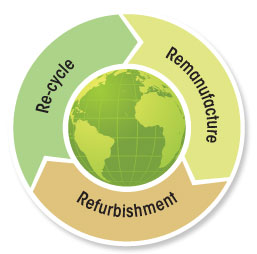Recycle
During the remanufacturing process APDI will inevitably remove unserviceable components or even whole units from the supply chain. These parts, components or sub assemblies are sorted enabling their recycling.
We separate (as far as possible) metals from the numerous types of plastics. Some rare earth metals are further sorted. In addition various types of unusable packaging is also sorted for recycling.
We monitor our wastes and, given that the main purpose of the business is to remanufacture products and thus avoid waste, as our business expands the amount of material we send for recycling increases. Our primary objective is to increase the % of materials remanufactured versus that recycled, in an effort to maximise the benefits to our customers, and fulfil the prime aim of the Circular Economy, to maximise the recirculation of vital resources.

Too dirty to recycle?
 Our Mission and Principles
Our Mission and Principles
of Remanufacturing

Our Mission is to be regarded as experts in the re-manufacture of electro-mechanical modules/ assemblies. Click a segment for more details.
Learn the module application and customer expectations. Understand the module design and component functionality.
Learn the failure modes- Critical to know the reman process will capture all failure causes. Develop re-use criteria for all components.
Ensure capability of new materials. OE materials/components preferred. Rigorous field trials. In-house testing to ensure functionality and life.
Understand assembly requirements and settings- dedicated tooling and fixtures to provide capability. Fully trained workforce participating in the development of the process and FMEA’s. Robust final inspection. 100% machine test often used. Continual improvement as process matures. Build team involvement.
Work closely with customers’ & supply chain from design through manufacture to field support specialists.


